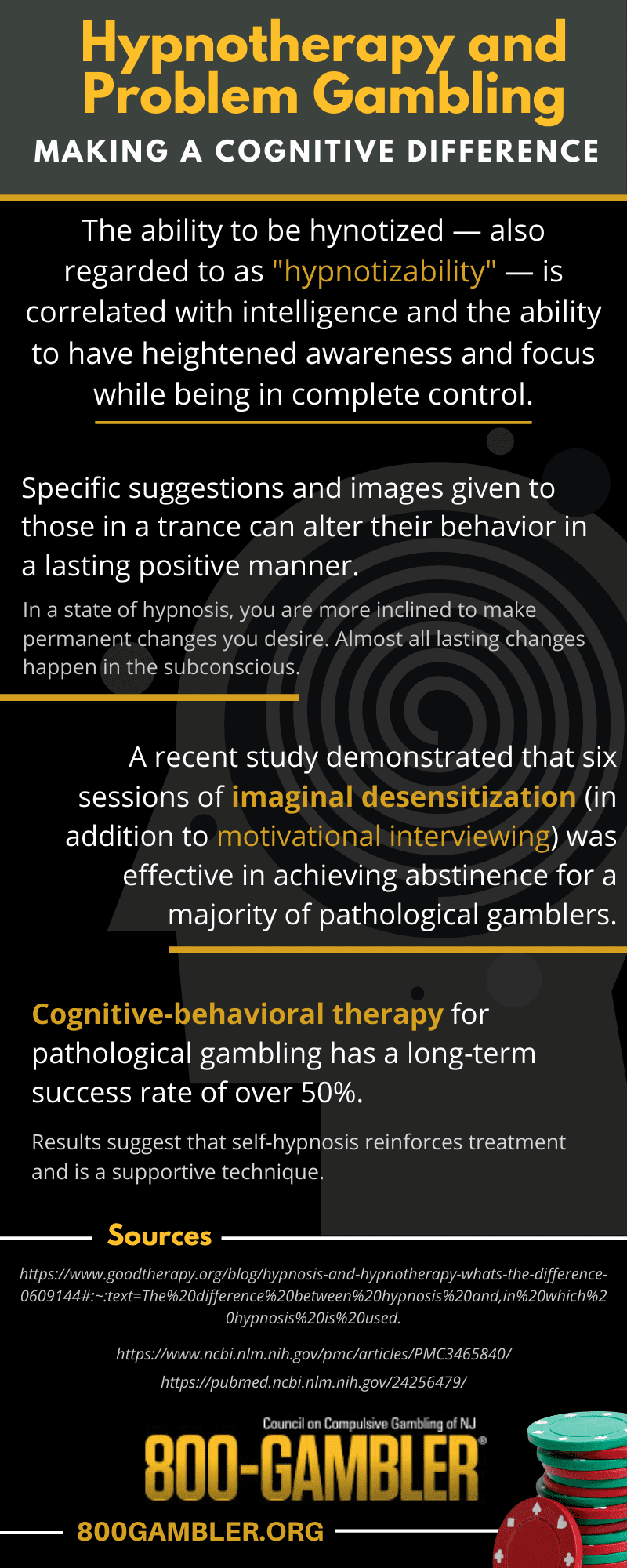Gambling problems can undoubtedly be crippling; often taking a financial and relational toll on those affected. If you or someone you know has developed a gambling problem, 800-GAMBLER understands how little self-control is felt. At times, it can feel like there’s no way out, aside from self-rationalizing or white-knuckling gambling abstinence. However, willpower may prove unfruitful as it begins to loosen its grip hours, days, or months down the road. However, there exists an alternative method to treat problem gambling — a way that may not immediately come to mind when you’re thinking of practical ways to dig yourself out of compromising activity: Hypnosis. Yet, does hypnosis work for problem gambling? We’ll take a look at hypnotherapy and how it may help an individual overcome a gambling problem.
While hypnosis has a distinct association with entertainment and performance art, its practice has brought measurable results to a host of recovery efforts for weight management, anxiety, sexual dysfunction, tobacco use, insomnia, and even problem gambling. Hypnosis — its application sometimes referred to as hypnotherapy — is a trance-like state in which the hypnotized individual has heightened focus and concentration. It is usually done with the help of a therapist’s verbal repetition and prompting of mental images, although self-hypnosis practices may also be effective. Hypnotherapy for gambling has shown significant promise as a viable treatment for individuals suffering from problem gambling.
Cognitive Treatment Strategies in Hypnotherapy for Gambling Disorders
Hypnotherapy for gambling works to disassociate wagering and placing bets from any benefits you perceive to gain. Several cognitive strategies help clients understand their thoughts concerning gambling:
Cognitive Restructuring
Cognitive behavioral therapy is built around the concept of cognitive restructuring. During a therapy session, an individual and medical professional discuss the varying aspects of problem-driven thought patterns. Techniques are then introduced that help reformulate the way an individual’s brain handles patterns in negative thoughts and the resulting actions.
Issues with cognition can lead to a distorted view of reality. Rational thought is often replaced by self-defeating behaviors that will interfere with the ability of an individual to successfully navigate through everyday life. These behaviors are built upon assumptions, overgeneralizations, and the incorrect analysis of an individual’s actions and the resulting effects.
It is often essential to work with a therapist or another medical professional to assist with cognitive restructuring. Due to the problems in cognition that often develop from negative habitual actions, it is very difficult for someone to practice techniques for cognitive restructuring. On their own, an individual already suffering from a problem habit may have difficulty recognizing problems in their thought patterns.
Certain problem gamblers exhibit irrational beliefs and superstitions regarding gambling activity. These may relate to winning probability, causal relationships between behaviors and winning, and self-talk. Cognitive restructuring analyzes ritualistic tendencies the problem gambler partakes in before, during, and after a gambling session and attempts to alter them. This component of gambling hypnosis can be extremely helpful in changing the way a gambler views the habitual acts they participate in games of chance.
Some of the most common “distortion cognitions” gamblers share are that gambling is financially viable, that they can extract themselves when they want to, and that any money lost is rightfully theirs, and that they should continue to gamble until they reclaim it. Treatment involves the client challenging their own beliefs and tackling black-and-white thinking, overgeneralizing, and catastrophizing. Cognitive reasoning employs strategies such as Socratic questioning, guided imagery, and other therapy techniques to rationalize thoughts.
Imaginal Desensitization
Problems with urge control are often marked by heightening tension before participating in the habitual act. The satisfaction of completing the aforementioned act is quickly followed by feelings of guilt for the initial participation in the activity. If, however, the act is unable to be completed, the state of tension remains in an individual leading to an ever-increasing drive to finish the activity.
This simple yet effective relaxation-based technique utilizes images to assist individuals. The method involves teaching a brief progressive muscle relaxation procedure, after which clients are instructed to visualize themselves being exposed to situations that trigger their drive to carry out the problem behavior in question. They are to leave the situation in a state of continued relaxation without having acted upon their urge. For problem gamblers, this aspect of hypnotherapy for gambling can significantly decrease the heightened state of arousal and anxiety typically associated with urges to wager or place bets.
Thought Stopping
Thought stopping, also known as thought blocking, is a common technique used to help clients change obsessive behavior. Many gamblers report feeling irresistible urges to gamble and describe gambling venues like magnets that draw them in. During gambling hypnosis, the client is instructed to monitor urges to place a bet. When they generate a thought regarding a wager in a game of chance, a few thought replacement techniques learned from hypnotherapy for gambling can be instigated. These include verbal commands and proceeding to replace the gambling-related thought with a productive one, the client snapping a rubber band against their wrist as a sort of punishment when unwanted thoughts surface, and dismissing the thought entirely.
Thought stopping, along with other techniques involved in hypnotherapy for gambling, can provide a secure foundation for a gambler to build upon when trying to overcome the cycles created by problem gambling.
Treatment Techniques in Hypnosis to Stop Gambling in Action
Studies show improvement among those afflicted with problem gambling or diagnosable psychiatric disorders such as problem gambling:

Do You Suffer from Problem Gambling? Call Our Helpline!
If you or someone you know is battling problem gambling, know that support, treatment, and hope are just one phone call away. Contact 800-GAMBLER today!
Sources:
https://www.healthline.com/health/cognitive-restructuring#gathering-evidence
https://www.researchgate.net/publication/254381105_Imaginal_Desensitisation



